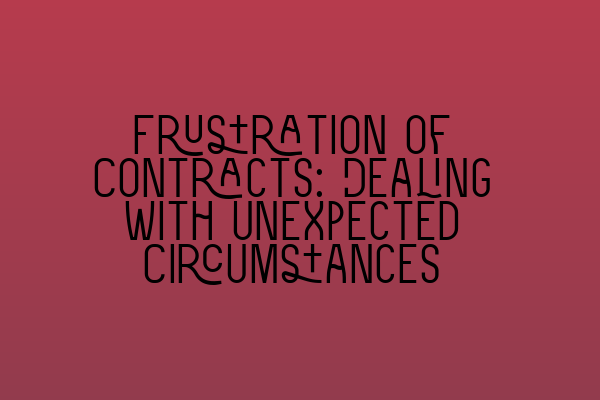Frustration of Contracts: Dealing with Unexpected Circumstances
Contracts form the backbone of our modern society. They are legally binding agreements that establish rights and obligations between parties. However, in some cases, unforeseen events may render a contract impossible to perform or deprive it of its commercial purpose. This legal concept is known as the frustration of contracts.
Understanding Frustration of Contracts
Frustration of contracts occurs when an event beyond the control of the parties makes it impossible or radically different to fulfill the terms of the contract. These events are typically unforeseen and could not have been contemplated at the time the contract was made.
Common examples of events that may frustrate a contract include:
- Natural disasters, such as earthquakes or floods
- Government actions, such as the imposition of trade embargoes
- War or acts of terrorism
- Death or incapacity of a key party or performer
When a contract is frustrated, the parties are released from their obligations under the contract, and any money or property exchanged is returned. However, the court may also order for a just and equitable distribution of losses incurred as a result of the frustration.
Legal Factors to Consider
When determining if a contract has been frustrated, the court will consider several factors, including:
- Whether the frustrating event was beyond the control of the parties
- Whether the frustrating event was unforeseen at the time of contracting
- Whether the frustrating event makes the contract impossible, illegal, or radically different
- Whether the frustrating event was self-induced or due to one party’s fault
It is important to note that mere inconvenience or unexpected financial loss is not enough to frustrate a contract. The event must fundamentally change the nature of the contract or make it impossible to perform as initially intended.
Steps to Take in Cases of Frustration
If you believe that your contract has been frustrated, it is crucial to take the following steps:
- Review the contract: Carefully examine the terms and conditions of the contract to determine if any provisions address frustration or force majeure events.
- Notify the other party: Inform the other party promptly of the event and your belief that the contract has been frustrated. It is essential to maintain open communication to avoid misunderstandings.
- Document the event: Gather any relevant evidence, such as reports or news articles, to substantiate the occurrence and impact of the frustrating event.
- Seek legal advice: Consult with a qualified contract law solicitor for expert guidance on how to proceed. They can assess the situation, advise on your rights and obligations, and help you navigate the legal process.
- Consider alternative options: Depending on the circumstances, there may be alternative resolutions, such as renegotiating the contract or settling on a reasonable compensation.
The Importance of SQE Contract Law Expertise
When dealing with a frustrated contract, having a solicitor with expertise in SQE (Solicitors Qualifying Examination) Contract Law is invaluable. An SQE-qualified solicitor possesses an in-depth understanding of contract law principles, including frustration of contracts. They can provide you with comprehensive advice tailored to your specific situation and guide you through the intricate legal process.
If you are preparing for the SQE exams or seeking further SQE contract law preparation, FQPS offers a range of courses, including SQE 1 Practice Exam Questions, SQE 1 Practice Mocks FLK1 FLK2, and SQE 2 Preparation Courses. These resources will equip you with the necessary knowledge and skills to excel in your SQE journey.
In Conclusion
Frustration of contracts is a complex area of law that requires careful consideration of specific circumstances. When faced with a frustrated contract, it is crucial to seek expert legal advice from an SQE-qualified solicitor to understand your rights and options. Remember to review your contract, document the frustrating event, notify the other party, and consult with legal professionals to reach a fair resolution.
For information about SRA SQE exam dates or general SQE 1 preparation, FQPS provides valuable resources and support, including SQE 1 Preparation Courses. Prepare effectively and be confident in your SQE journey.
